With the election of the 44th Montenegrin government and the constitution of the new parliamentary assembly, the issue of Russian influence has been further emphasized. Despite the fact that this issue dominates public discourse, it seems that Russia’s actions through proxy actors have not been sufficiently and adequately presented to the wider public. The statement of former Prime Minister Dritan Abazović that Russian influence on Montenegro has never been lower than in the past year, along with the increasingly infrequent statements from Russian officials about Montenegro, especially compared to the period from 2016 to 2022, create the impression that Russia is not interested in the region as it was before the aggression on Ukraine. However, to present the full extent of Russia’s actions, it is paramount to depict the short-term strategic level of influence, which involves engaging proxy organisations and individuals, not just the long-term one which manifests itself through Serbia’s state politics.
After the aggression on Ukraine, cooperation with Russia has become a slippery slope for the state politics of Serbia as well as for its proxies in the region. The failure to impose sanctions upon the Russian Federation and the non-alignment with the foreign and security policy of the EU has resulted in the agenda of keeping the region outside of the EU through proxy actors that the public does not associate directly with official Belgrade or Moscow. The analysis by the DFC will indicate the actions of these actors, and their alignment with the values and political agenda of Russia in Montenegro and towards the Western Balkans.
The Serbian Orthodox Church – The 63rd Parachute Brigade
The visitation of the Metropolitan of Montenegro Joanikije to Moscow in October 2022, and the joint liturgy held at the Sretensky Monastery with the Patriarch of the Russian Orthodox Church Kiril during the height of the Russian aggression towards Ukraine, are remembered by Joanikije’s statement that the Russian church and Russian people are under temptation, and that he will pray for them.
However, in the context of operational activities regarding Russian influence in Montenegro, the presence of Jovan Ćulibrk in Moscow, and his connections to the 63rd Parachute Brigade of the Serbian Armed Forces, are indicative. In addition to its military tradition, the 63rd Parachute Brigade of the Serbian Armed Forces, as part of the elite forces for actions behind enemy lines, is also utilised for psychological-propaganda purposes, primarily in inducing the anti-western narrative in Serbia as well as Montenegro. This is evident in the statements made by Major General of the Serbian Armed Forces, Ilija Todorov, in 2019. According to him, that brigade is a symbol of resistance towards NATO’s aggression. The identical statement was made by the then Minster of Defence Aleksandar Vulin during the ceremony of awarding medals to the members of the former 63rd Parachute Brigade on the 20th anniversary of the defence against the NATO aggression on the Federal Republic of SR Yugoslavia.
The Brigade’s role is also evident in the synthesis of elements of Russo-Serbian soft power, combining propaganda elements in psychological warfare. The Russian Airborne Troops (RAT) and members of the 63rd Parachute Brigade are thus used in synergy with the Serbian Orthodox Church to expand influence through the promotion of the military strength of both states. The marketing involvement of the bishops from the Serbian Orthodox Church such as Jovan Ćulibrk as additional subjects in the promotion of the expansionist tendencies of Serbia and Russia, is reflected in his presence at these events.
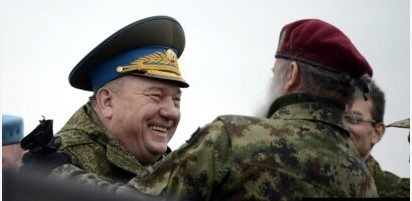
The fact that Jovan Ćulibrks role is important is also evident in the favour shown to him by the Metropolitan of the Serbian Orthodox Church in Montenegro, Joanikije. In addition to the joint liturgy held together in Moscow on November 1st, 2023, Ćulibrk also served the liturgy on the occasion of the commemoration of Petar the Second, the Visionary of Lovćen, in the Cetinje monastery, even though he, as the Bishop of Pakrac-Slavonia, is responsible for the Slavonia region (Croatia).
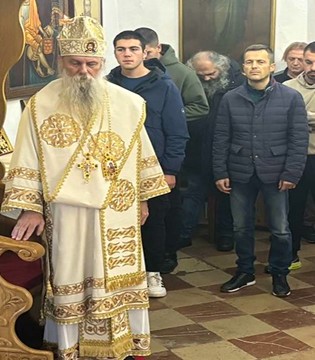
The first joint exercise of the Russian and Serbian armed forces, specifically the RAT (Russian Airborne Forces), and the 63rd Parachute Brigade of Serbia, took place at the Nikinci ground near Ruma on November 14, 2014. General Vladimir Shamanov and the members of the 63rd Parachute Brigate from Niš met on that occasion. At that time Shamanov stated that the goal of those counter-terrorism actions, as you have just seen, is the protection of individuals and the state identity in general. His statement is indicative, considering that in the same year, Vladimir Putin used similar linguistic formations, citing the protection of the Russian-speaking population from genocide as a pretext for the annexation of Crimea.
The role of the bishops of the SOC and the 63rd Brigade in spreading Russo-Serbian influence was evident during the enthronement of Bishop Metodije of Budimlje-Nikšić on September 26, 2021. During the event, Bishop Jovan Ćulibrk of Pakrac-Slavonia parachuted down and served the liturgy in the Church of the Holy Transfiguration. In the same year, on October 7th, Bishops Metodije Ostojič and Jovan Ćulibrk, in the uniforms of the Serbian Armed Forces, attended the ceremony commemorating the 21st Paratrooper Pentathlon, organised by the 63rd Parachute Brigade. Considering that Bishop Metodije did not serve in the military, his involvement in those celebrations is questionable. Indications of hybrid activities, meaning the misuse of the clerical position to spread anti-western and pro-Russian narratives, were also observed during the liturgy in the Church of Saint Basil of Ostrog on the 17th of July 2023. Metodije stated that the fascination with the West has brought so much harm to the Serbian and Russian people and that Russia is the hope for the entire freedom-loving world, in the presence of the Russian ambassador to Montenegro, Vladislav Maslenikov.
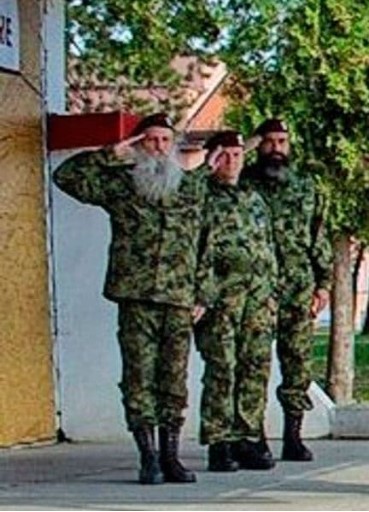
The broader operational engagement in promoting views close to the official Kremlin positions was confirmed when Metodije chose Mijajlo Backović, a former member of the 63rd Parachute Brigade and a recipient of the Order of the Russian Airborne Troops, as his secretary. Major General Aleksandar Salujanov, a former commander and veteran of the RAT, was the one to present him with the award. Backović is also the founder of the Orthodox Brotherhood “Miholjski Zbor”. The operational activities of that organisation in spreading anti-Western and pro-Russian narratives were evident in the political and security crisis in Kosovo, as well as in the process of forming the 44th Government, and in the campaign leading up to the upcoming population census in Montenegro. Although Miholjski zbor presents itself as a humanitarian organisation that helps socially vulnerable citizens and collects contributions for them, during the crisis in Kosovo and the clashes between KFOR and demonstrators in Zvečan on May 29, 2023, this organisation issued an anti-Western propagandistic statement. They accused KFOR of supporting such behaviour and the prime minister of this Frankenstein state through international organisations and the Quint states.
Miholjski zbor also used the process of forming the 44th Government of Montenegro to spread pro-Kremlin propaganda and anti-Wester values. Thus on 14 July 2023, in a statement by that organisation, the narrative that the West does not allow Serbs to enter the government, which was promoted by the leaders of the collation For the Future of Montenegro, was spread. In the statement issued by Miholjski zbor, they recognised the friendship with the Russian people, who instead of bombs and uranium brought only brotherly help and freedom throughout history. The statement also points out that the constant attacks and pressure on the Serbian people in Kosovo by the terrorist government in Prishtina, the recent events in the Republic of Srpska, as well as the formation of the new Government of Montenegro without Serbian representatives vividly illustrate the pressure faced by the Serbian people in the region.
The latest actions of the Orthodox Brotherhood Miholjski zbor are reflected in the threatening statement to Prime Minister Milojko Spajić on October 26, 2023. In it, they stated: Mr Spajić, since you have been aboard for quite a long time and thus are not aware of the effort and struggle invested in the survival of the Serbian people in the territory of Montenegro, we sincerely advise you not to test our patience. Miholjski zbor activities always coincide with significant events in the socio-political sphere. The genesis of the formation of this organisation through the connections to the 63rd Parachute Brigade is an indicator of its alignment with Russo-Serbian proxy cells, which serve to create turmoil, raise national and ethnic tensions in society, and engage in hybrid operations by exploiting established narratives about the endangered Serbian national and Orthodox identity.
Advisors and state secretaries
On the day Andrija Mandić was elected as the president of the Parliament of Montenegro, among the members of the coalition For the Future of Montenegro was his political advisor Vladimir Dobrosaljević, an active promoter of the anti-NATO protests organised by the former Democratic Front (DF) in October 2015. During the formation of the 44th Government, he was one of the spokespersons promoting the narrative that Serbs were prevented from entering the government. He also expressed anti-Western constructs during his appearance on Sputnik on August 11, 2023. On that occasion, he stated that Serbs, unlike other national communities in Montenegro, are ghettoised and that the graffiti “When the army returns to Kosovo” had been repainted in Podgorica due to Western influence. Dobrosaljević stated on multiple occasions during guest appearances on Serbian television that the entry of FTFOM into the government signifies that the ethnic engineering project during the rule of the Democratic Party of Socialists has failed.
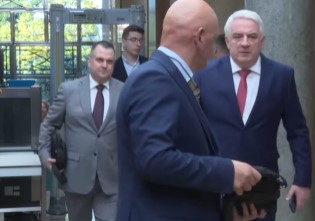
Through a political agreement with Europe Now Movement, the coalition For the Future of Montenegro (FTFOM) gained the opportunity to appoint a state secretary responsible for education in the Ministry of Education, Science, and Innovation. According to the same agreement, after one year the education department will be assigned to a member of the For the Future of Montenegro coalition, who recommended Dragan Bojović, vice president of the Democratic People’s Party for the position. Bojović is a philosophy and ethics professor by profession. The education department can be very intriguing within the context of Russian influence, taking into account the interest of the Democratic People’s Party (DNP) as a direct exponent of Russian influence in Montenegro. Additionally, the connections of Bojović with individuals and institutions in Russia add another layer of interest to this scenario. Upon the invitation of Sergei Baburin, the president of the Slovenian Academy of Science, Education, and Culture, Bojojvić thus participated in the international forum organised by that institution in Moscow on January 31 and February 1, 2019. On that occasion, he also met with Anatoly Karpov, a member of the United Russia party of the Russian State Duma, and a former world chess champion. The fact that Igor Damjanović attended the meeting is interesting. He is a propagandist from the IN4S portal known for following the conflict in Ukraine as a pro-Russian blogger, reporting on the activities of the Russian army on his Telegram channel and the pro-Russian portal IN4S.
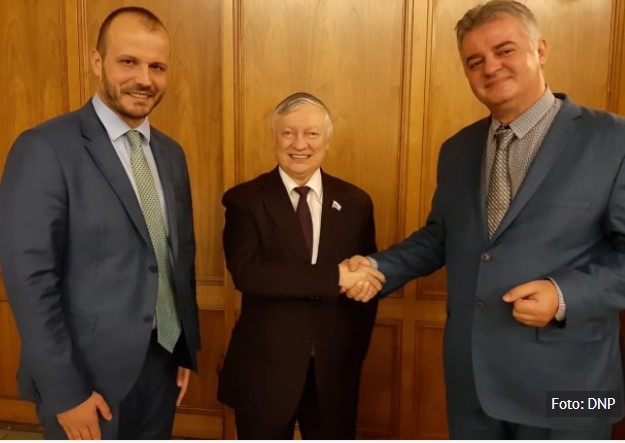
Baburin was denied the opportunity to speak at the Faculty of Law in Sarajevo on September 13, 2023, due to his denial of the Srebrenica genocide and the praising of Slobodan Milošević. The Montenegrin public also remembers him for his statement in March 2020, when he suggested that the property of the SOC should belong to Russia, arguing that the places of worship were mostly built with Russian money.
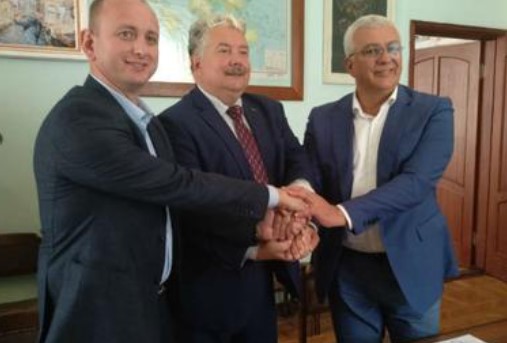
The entry of For the Future of Montenegro into the Government, and the changed geopolitical circumstances influenced by the war in Ukraine have had a contribution towards the proponents of Russian influence toning down their rhetoric and changing their tactics. The insistence of the SOC on introducing religious education into the education system of Montenegro, as well as the allocation of the education department to the For the Future of Montenegro coalition after the government reshuffle within a year, implies that the new strategy for expanding Russian influence in Montenegro will involve a shift in the paradigm of values of the Montenegrin society. With an increasing number of events and revisionist manifestations which relativise the antifascist and civic character of the Montenegrin state, it is clear that the vision for achieving the goals of Russo-Serbian proxies is of a long-term nature. It is imperative that civil society organisations, independent media, and individuals highlight such occurrences so that they would not become part of institutional activities or tools in the hands of a foreign actor aiming to achieve set goals by exploiting all dilemmas and controversies within the divided Montenegrin society.

